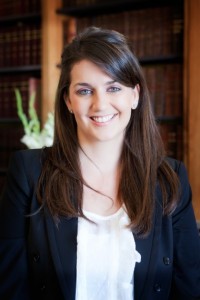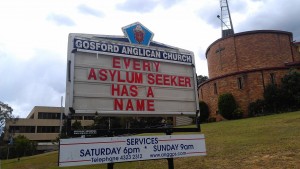Refugee advocate, barrister and filmmaker Jessie Taylor says she is disappointed and saddened by the Church’s silence when it comes to asylum seekers.
Taylor’s personal story made waves in mainstream media last year when it was featured on ABC’s Australian Story. For a number of years, she has been a high profile advocate for the rights of asylum seekers, speaking in churches and other forums about the issue.

Jessie Taylor
“I first started visiting detention centres in about 2001 with a friend of mine I was going to church with at the time. I didn’t have any particular political views, except for believing that if a person was in jail, then they had probably done something to deserve being put there. But meeting people in detention completely woke me up,” Taylor told Eternity.
Taylor got more and more involved in human rights and asylum seekers and ended up applying for a Mission Travel grant which played a significant part in allowing her to travel to Indonesia with a film crew to record the stories of some of the asylum seekers she met there.
The result was her documentary Between The Devil and the Deep Blue Sea, which seeks to convey the perspective of a potential “boat person”, and the experiences and decisions that lead them to consider boarding boats destined for Australian shores.
While she was in Indonesia, Taylor met a 14 year old boy named Jaffar, an Afghan Hazara asylum seeker, in an Indonesian jail. With no other practical way to help him at the time, Jessie gave him her phone number and told him that if he ever made it to Australia, she’d look after him.
When Jaffar finally made it to Australia several months later, on a boat he secured through a people smuggler, he called Jessie from an Australian detention centre. Once his visa was approved, and the government had determined Jaffar was a genuine refugee, Jaffar went to live with her in Melbourne, and then 27-year-old Jessie became foster mum to the 14-year-old refugee.
Jessie Taylor is a woman who is living out her passion and anger about how Australia is treating asylum seekers. Now 31, she’s a human rights barrister, and travels the country speaking about the issue, screening her documentary and advocating for the rights of asylum seekers. But she says she has been left feeling very empty about the Christian church’s involvement in the issue. She says she, and many advocates with a church affiliation who work in the refugee sector, often feel like they are acting to promote justice “in spite of the church, rather than because of it”. She speaks on the phone as a person dismayed and disappointed, though tries to be guarded about her criticism.
“I think there is a very strong mandate in most faiths, but particularly Christianity, to do what you can for the weakest and most vulnerable in society. It’s not something that Christians can turn away from or ignore. There are many Christians who do wonderful things in their personal and professional capacities, but there are many, many more who are happy to let issues of justice and human rights take a backseat in the way they see the world and their faith.”
But what Jessie sees in practice are many (“though not all,” she stresses) Christians who preach sexual purity as the only measure of morality, but who can happily step over a homeless person on the street and not feel anything, likening that experience to watching Australia’s hardening policies on asylum seekers and the personal impact of those policies. “I find that pretty disturbing.”
Taylor’s personal faith has been challenged by her desire to see Christians practice what they preach. And while she admits the whole issue of asylum seekers in Australia can be an intimidating one to address, even for her, in what she calls “the most hostile and hateful policy Australia’s seen since the White Australia policy”, the church, in her opinion, should play a much bigger role in calling leaders to account for their policy decisions, and facilitating ways in which Christians can support asylum seekers and refugees in meaningful ways.
“At the moment, we have a situation where people are living in the community with very few to no entitlements: little welfare, accommodation, furniture. They can’t afford to pay their rent, public transport, electricity, and often have to decide whether to pay those things or feed the children. There’s a great deal of need to provide affordable accommodation, food donations, furniture donations. That’s a very real way in which people could assist.”
Jessie also stresses the importance of walking alongside and supporting people who are subject to what she calls Australia’s “punitive policies”.
“You can’t overstate how important it is for people in detention to have visitors. If you watch the news or listen to the radio in this country, you’d be forgiven for thinking that we all just wish asylum seekers would be shot on site. But most people don’t feel that way, and I think it’s important that people in detention see the people who are welcoming and hospitable, because they desperately need to hear it.”
A few weeks after Jaffar arrived in Australia in February 2009, Jessie was watching the news with him, and saw his face fall. “There was such hostility on screen towards asylum seekers,” she says. “It was like Jaffar was thinking, “maybe no one wants me here”. That sense can last a long time, well after people get their visas and start trying to make a life here. There’s this sense of being unwanted and unwelcome that’s pretty damaging.”
This story might just be about Jessie Taylor, but she’s not the only one decrying a lack of action on the part of churches.
 True, there are churches, and individual Christians doing all they can to assist: one church in Sydney’s inner west, St Peters Anglican, was featured in the mainstream media earlier this year for helping rehouse 90 asylum seekers “dumped” in an inner-city hotel the day after leaving detention, with nothing but what they carried out. Activate Church in South Australia is run by Brad Chilcott, the founder of the ‘Welcome to Australia’ movement that runs advocacy events and media campaigns on the rights of asylum seekers in Australia. And many, many churches have screened Jessie’s documentary in their communities, in an effort to change the tide of public opinion. While Gosford Anglican has become an internet sensation for making bold statements about asylum seekers its public noticeboard at the front of its church. And those are just three examples.
True, there are churches, and individual Christians doing all they can to assist: one church in Sydney’s inner west, St Peters Anglican, was featured in the mainstream media earlier this year for helping rehouse 90 asylum seekers “dumped” in an inner-city hotel the day after leaving detention, with nothing but what they carried out. Activate Church in South Australia is run by Brad Chilcott, the founder of the ‘Welcome to Australia’ movement that runs advocacy events and media campaigns on the rights of asylum seekers in Australia. And many, many churches have screened Jessie’s documentary in their communities, in an effort to change the tide of public opinion. While Gosford Anglican has become an internet sensation for making bold statements about asylum seekers its public noticeboard at the front of its church. And those are just three examples.
But Jessie’s talking about the overall Christian church in Australia who she still thinks aren’t doing enough.
“I want to see the sort of outrage that would arise if our government tried to send Jesus to Papua New Guinea to rot in a detention centre. He was a refugee. I know it’s a cliché, but it’s the truth. You can’t deny the centrality of the refugee story in the history of the Christian faith. I want Christians to make that connection and feel protective, welcoming and loving toward asylum seekers in the same way they would towards Jesus himself. That’s the sort of anger I’d like to see… an immediate, compassionate, energising anger that motivates Christians to demand that our government do better.”
Email This Story
Why not send this to a friend?
